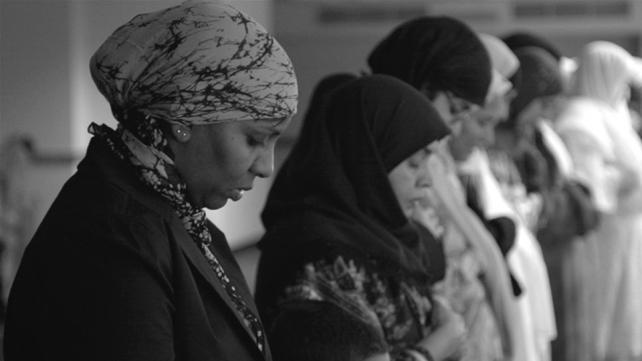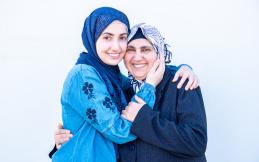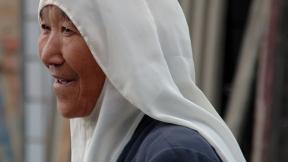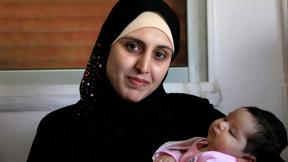
Last Friday, I was all set to give a Khutba about the need for Muslims to plan ahead on an individual and community level. My notes were ready and I was in full "Khutba mode". But before sermon time, I decided to change the topic completely -- to talk about the exclusion of Muslim women from the mosque and community life.
It wasn't an earth-shattering event that made me change the topic. It was an email. And it proved to be the proverbial straw that broke the camel's back. It was one of five emails I received last week about Islamic events with a clear "brothers only" statement. One notice for a regional conference even stated categorically that there was no space for women and children under 15 at the event.
But the emails were only part of the story. A week before, I had given a Khutba in another, brand-new mosque in the heart of Chicago. After the prayer, while in the elevator, I overheard four Muslim sisters speaking angrily about their experience in the Masjid.
"If I wanted to watch TV, I'd stay home," said one of the women, disgusted. I asked them what was wrong, and they told me how they could only see the Imam through a TV system set up in the women's section. Moreover, the space was inconvenient, uncomfortable and was changed twice that day. This was despite the fact that months ago, the leadership of this mosque had promised me that they would involve sisters in decision-making about how the women's space would be set up.
The Khutba
I was speaking in Chicago's oldest mosque where the main prayer hall accommodates about a thousand people. It has a small, curtained off space in the corner for about 40 or so women. Due to the sensitive nature of my topic, it did occur to me before the Khutba that I might not be invited to give a Friday sermon there in the future. Nonetheless, I made the following points and asked these questions:
Who decides how women's space in the mosque is allocated and organized?
How many women sit on the Board of Directors of our mosques?
If women are part of the Board of Directors, are they elected, chosen by women, selected by both men and women or are they simply the wives of male board members?
I also reminded the audience that in the Prophet's mosque, women could hear and see the Prophet Muhammad, peace and blessings are upon him, and later, the leaders of the Muslims (Khulafa) when they spoke from the pulpit. Actually there are reports of interaction with the Prophet when women raised questions. Caliph Omar even went back to give another sermon to withdraw his opinion when a women from the audience gave him critical feedback after his Khutba.
Moreover, when the Prophet felt that the women were too far away to hear or he had specific points to make, he would walk over to their section and present a Khutba for them.
Examples from Islamic history
Women in early Islamic history were active not just as "mothers and wives" but contributed as individual Muslim women in all aspects of the community.
On a scholarly level, there was Aisha, may God be pleased with her. She is credited with disseminating the knowledge of Islam and information about almost all aspects of Islamic life. Today, nearly half of the Islamic jurisprudence of the Hanafi school of thought (which is followed by about 70 percent of the Muslim world) comes through the students of Aisha alone.
On a political level, there was Umm Salama. During the signing of the Treaty of Hudaibiya, when none of the Muslim men agreed to forego Hajj due to the demands of the pagan Meccans, the Prophet consulted Umm Salama. Her advice to him was to perform the rituals indicating that they would not be performing the pilgrimage, and the Muslims would follow. He heeded her advice, and as she suggested, the Muslims accepted this.
After the death of the Prophet, one major issue was how to preserve the authenticity of the Quran. Although the Quran had always been committed to memory and writing, the written pages were scattered. When a master copy was put together at the time of the first Khalifa, Abu Bakr, that copy was not kept with him or any other Muslim man. It was kept with a woman -- Hafsa (may God be pleased with her).
Finally, in Madina during the leadership of Omar (may God be pleased with him) Al Shifa Bint Abdullah was made in charge of trade and commerce in the city.
These are just a few examples of the dynamic role women played in early Islamic history. But they are of no use if the inclusion of Muslim women in the mosque and community is reflected only in theory.
"Men's Islam" or Islam for All
While sisters are a full part of the community, many mosques are run as though Islam is just for men. This is evident by looking at women's spaces, their decoration, their uncomfortable size and design, the absence of women from the Board of Directors of most mosques and the relegation of their activism and ideas to a "women's committee".
Muslim women in North America are as professional as Muslim men and contribute as generously. I remember fundraising in a New Jersey Masjid. Five Muslim women contributed $25,000 each within the first 12 minutes. It inspired me to ask the audience: is there a man who can match these donations?
And that's how women's participation is. They know they will not get to Jannah because of the good deeds of their husbands. Each man and women has to find his or her own way to success in this world and next, knowing that God's promise is this:
"I will deny no man or woman among you the reward of their labors. You are the offspring of one another." (Quran 3:195).
"Each person shall reap the fruits of his/her own deeds: no soul shall bear another's burden." (Quran 6:164)
The Reaction to the Khutba
Normally, two or three people will approach me after a Khutba to thank and compliment me for it. This time, ten times more people came over, appreciating what I had said, Alhamdu lillah. That's one of the most positive instances of feedback I've ever gotten in years of giving Khutbas! Although I have yet to hear the response from the leadership of the Masjid, this gives me hope that the community is ready for change.
A few board members also spoke very positively about the points I raised, including one of the founding members. The question is, who is stopping the change?
Current Chicago Masjid Spaces for Women
In Chicago, I estimate that in about ten percent of the Friday prayer locations, there is proper space for sisters' participation. In these places men and women are in the same location without a curtain or wall separating them. In terms of the remaining 80 percent of mosques that do have a space for women, these are often cramped and inconvenient. By inconvenient, I mean that women cannot see the Imam or do not know what is happening in the congregational prayer. In about 10 percent of the Chicago-area mosques there are no spaces for women.
One Muslim sister in the city related to me her experience after visiting one of the largest mosques in Chicago that had an inconvenient room for women. When she entered the women's area, a group of sisters was standing in line, thinking prayer had started because the recitation of the Quran could be heard. Taking Quran recitation as a cue for congregational prayer, the sister joined the others in line. After several minutes, when the man ended his recitation without calling for the next step of prayer, Ruku, the women learned that it was not a prayer. Needless to say, the women were humiliated and upset about this confusing situation. This is just an example of the practical problems this segregation in prayer places causes.
An additional problem in mosques where women cannot see the Imam is the fact that the noise level often becomes unacceptable. This tends to be because most men dump the responsibility for taking care of their active children on their wives when they go to the men's section of mosque. Also, since women can't see what's going on, they end up talking to each other. This leads to the Imam asking women to "be quiet please," furthering tension and exclusion.
When women are out of sight, it's also more likely that they will be out of mind. That means their discourse and participation are ignored on a Masjid and community level. Moreover, few women have easy access to the Imam, which worsens the problem, since the Imam is the one man who can make a significant difference in bringing women's issues and problems to the attention of other Muslim men in the community. This perhaps explains why you don't normally hear many Khutbas on women's challenges here in America or abroad.
Negative Dawa
The situation becomes worse when non- Muslims visit. They see there are hardly any women present in the mosque. Or, if there are a few, they are confined to a small and less ceremonious corner. What kind of Dawa is this? What kind of impression does this give in our current context, where the battle against stereotypes is ten times harder than it was pre-9/11 America? This visual impact is far greater and far more lasting then tens of books lauding the status of women in Islam. Since Shahadah (witnessing) is the first pillar of Islam, this obstacle to outreach must be dealt with.
Of course, women, unlike men, are given a choice by the Prophet to pray at home or in the mosque. But the Prophet was categorical in telling men "do not stop women from coming to the Masjid." Friday prayers are also optional for women. But considering that Friday sermons are the only Islamic educational opportunity available to most women in the North America Muslim women should attend Friday prayers. This is especially important because we do not yet have a widespread tradition of female teachers, as is the case in the Muslim world. I am pretty sure Caliph Omar would have encouraged Friday prayer attendance by women if he was alive today in the United States, may God be pleased with him.
Who is stopping women from the Masjid
Knowing both of these Masjids, their volunteer leadership, and the fact that women are on their boards, I don't think either of them stops women from attending and participating. The first Masjid's president did make an announcement twice in front of me inviting women to visit the new location to help determine the sisters' space. I think, perhaps, need sisters taking these issues more seriously instead of accepting the current situation.
In the second Masjid, I learned that some sisters prefer to pray behind a curtain. An easy solution could be to make a larger area where women who do not want a curtain between the men and women, as was the practice in the mosque of the Prophet, can pray. Behind them, women who are comfortable praying behind a curtain can do this.
With lower donations as a result of donor chasing by the FBI, extra expenses for security and legal battles, which six or seven Masjids in the Chicago-area are going through, the last thing on the mind of Muslim leadership is women's space. About 80 percent of the Masjids in the Chicago area do not have any permanent Imam. Volunteers like me are asked to offer the Friday sermon on a rotational basis. Almost all of these Masjids' leaders are busy professionals who volunteer their time to run the community centers, schools and Masjids. Unless someone is pushing for something, things will continue as they have been.
This is why I have come to the conclusion that the agenda of women's space will not come to the forefront unless Muslim women take it upon themselves.
Establishing a Muslim Women's Caucus
It is time that sisters come together and provide leadership in clearly defining a Muslim women's manifesto for change in mosques in North America. If these sisters are practicing Muslims, they will have a far higher level of success in demanding change and leading it.
I would like to make a plea to leading Muslim women in North America who are respected and honored by the community to call a national women's caucus on these issues. In this conference, the following things need to be discussed and tackled:
1. An agenda outlining change in the Muslim community centers and Masjids in which
- Each Masjid should formally declare that it is unIslamic to stop women from attending a mosque
- The need to restore women's space in the mosque as it was at the Prophet's time (i.e. without a curtain or a wall separating men and women) is stressed
- Develop a welcoming space where they have a clear view of the Imam
2. One-third of Masjids' Board of Directors should be composed of sisters, one-third of brothers, and one-third of people born in North America.
3. A mechanism for an ongoing Muslim Women's Caucus needs to be developed
On the issue of women's exclusion from the mosque, this Muslim Women's Caucus may want to do the following:
- Invite the leadership of major mosques, as well as national and continental Muslim organizations to a closed-door dialogue with an equal number of Muslim women leaders present.
- Give a deadline to all Masjids that do not have a space for women to allocate one in consultation with women.
- If space is extremely limited and there is no cultural and ideological objection to it, then allocate time for additional congregational prayer for women lead by women as was done by Umm Waraqa with the Prophet's permission when she lead her staff regularly in prayers in her own home as reported by Sahih Abu Dawud. (If thousands of women lead other women in prayers throughout Pakistan, it can be done in a mosque here as well).
Shura (consultation) has been a way of life for Muslims (42:38). If our families and our communities are not run on Shura, open communication and proper representation, how will we grow?
"The true believers, both men and women, are friends to each other. They enjoin what is just and forbid what is evil; they attend to their prayers and pay the alms and obey God and His apostle. On these God will have mercy. He is Mighty and Wise." (Quran 7:71)
Photo Attribution: Beth Rankin (BohPhoto) - http://commons.wikimedia.org/wiki/File:Islamic_Society_of_Akron_%26_Kent_-_women_jummah_prayer.jpg








Comments
Salamwalaikum- Very inspiring. One of the best articles I have read and a good start. It is great to see this topic finally be explored, especially by a man. I would like to contribute something to this conversation: I think it is important to remember the responsiblity of BROTHERS to educate each other, speak up to EACH OTHER, and defend women in spite of the presence of EACH OTHER. Women have already been fighting to be heard but it has mostly been without the support of the men in the community: It has been a one sided fight that speaks to a division that is present in our community. It is a division that sometimes lets men be able to not take any or enough responsiblity of the well being of women in the community. Ironically one of the main platforms of islam has been the role of men as caretaker of his family and the community and yet this is often the role that has been most shirked. While these men abuse this role to overpower and bully women, they often do not take any accountability for the social conditions that exist in the mosques and elsewhere. Caretaking afterall is different from dominance and dominance is the last thing any human being needs.In general it is a fact that there is a large majority of women in the community who do not feel supported by men in the community, not emotionally, not physically and not spiritually and if anything feel hurt by the men in the community. I myself have had the experience of not having any brothers to ask to help in carrying heavy items or stand guard as I walk to a car and when I have asked for help have gotten ambivalence or worse disrespect. This ramadan, in an attempt to break iftar in various Chicago masjids I had the horrible experience of going to over 10 new masjids and never having a space to pray or a comfortable way of getting food. In fact, often the men fed themselves first and did not even leave any food for the women unless it was scraps. Think about that for a minute. In terms of women trying to articulate their needs, Men need to remember that usually when a woman in the community does try and speak up in an already hostile environement, she risks being left alone to defend herself against a mob of men. Why are muslim men not keeping each other in check? Why are they not being self aware enough to notice when they are being completely selfish? Surely someone else was mentally present enough to realize that the few women who came had been fasting all day and needed food also , right? Or did they just not care? Disturbing isn't it? In general why is it okay in our community to treat women like second class citizens? If it is ignorance then men need to self educate and then educate each other. Afterall, It is not women sending the message out there that they do not deserve respect and I think as much as a female caucus is needed a male self education and then peer education group is needed equally if not more. I think men need to call other men out on their behaviors. There is an increasing distrust of muslim males by muslim females. Men who take much pride in being religious and pious often do not even make the first step of reaching out to women in their own community let alone being effective in reaching out to other communities. Honestly, often times in mosques women do not feel secure, safe and attended to. We are mostly bullied around or ignored. Putting the responsiblity of trying to educate these men and change this system just on women furthers the problem. If women felt safe enough to speak up believe me they would and if these men were interested in their opinions of well being, well then this issue would not need to be resolved in the first place. Men, Make an environement in which women feel safe to speak up. When they do speak up, maintain the sanctity of the environment by openly criticizing the behavior of men in the community who attempt to rule over the women. If you speak up then it will send the message that it is not acceptable. Take the opportunity to be aware of women, that means keeping a watchful eye, even of other men in the community. I think if more men make an effort inshallah change will come and we may make progress toward healing our community.
Location
This article is very good and illustrates the needs of the mosque, however I beleive that such rights will never come to light. There is an inherent fear of women in the mosque, a strong desire to maintain the status quo and the belief that such issues while they need to be addressed are not that pertinent to Islamic life. Beyond that there is the beleif that space needs to be physcially separates by walls and other barriers. This is often what is taught amoungst Salafi organizations and other extreme groups. I also attended a QSS conference and found if laughable that a woman was desiginated question taker and had the responsibility of waving her glvoered hand furioulsy over a room divider so that the men can ask questions for her. My own mosue recently installed a TV so we can watch the imam. Tell me, if the prophet didnt have a televison what did he so for the Muslim woman?Brother your article is correct but no matter how we try, Muslim woman will always hidden, kept quiet and ignored.
Location
i have been to a number of mosques in my area, there is one in Brampton, ON where there is no seperation, there is one huge room, where the women just simply sit towards the back. it has such a wonderful family atmosphere, the little kids will sit with their dads or moms, maybe switch partway through, they do not feel cramped or irritated. the men don't act inappropriatly by watching the women or anything, it is all very respectful. at the end of prayer, a husband or two may walk towards the front of where the women are, and let his wife or daughter know where he will be outside, waiting for them. no one is uncomfortable. it is such a healthy atmosphere, for the whole family. you feel like a human being. people might be afrai of what taking down a few bedsheets will do, it won't do anything but create a tighter, healthier, more fulfilling experience at the mosque for everyone.
Location
Excellent analysis! This is truly important both for correct observation of valuable traditions and da'wa. Thank you.
Location
Subhanallah, br Mujahid, you truly outdid yourself this time with this article! Inshallah, can't wait to attend the next Thinking Retreat when you are present in Toronto
Location
Salaam Walaikum , very good topic. very good information unfortunately majority of muslims donot practice this way they bring their customs culture and painting to the world as islamic culture . This topic should be discussed in all masjids all over the world and to remain themselves and other fellow muslims about status of women in IslamSalam Walaikummanzur
Location
Thank you brother for addressing this issue,its exactly the same problem here in U.K. I have not bothered to go for Jumuah since there is practically no space for women, when I went to the mosque during Eid, we , on the women's side made a lot of mistakes because we couldn't see the Imam. It was an humiliating experience.
Location
Assalamu 'Alaykum Wa Rahmatullahi Wa Barakatuhu,Jazak Allahu Khayr brother for the comprehensive article detailing what is unfortunately an oft-neglected issue. Insha'Allah the brothers and sisters of the North American Muslim community will be able to benefit greatly from your detailed work.Wa Allahu 'AlamWassalam
Location
Personally speaking this issue has been with us for 4 decades; numerous discussions, debates and suggestions have resulted in many attempts at partial solutions. Alhamdulillah!, at present in our area we have several major masajid with completely compliant women's areas. The "curtain" that some families/communities require for women to be allowed/ welcomed to the mosque was often a hold-up to agreement on structuring the desiqnated space. Solutions have included rattan walls and room dividers, as well as loft or balcony constructions. Since many of these were done with great attention to beauty and the comfort of the attendees + children, it is clear that there was input by women. Finally our "hijab" is once again, our responsiblity and the 'curtain" of exclusion is lifted. Let's not slip backward- again!
Location
Finally , a man spoke up. Men are the Qawwam of women. Qawwam comes from Qaama which means to stand and Qawwam is one who makes something/someone stand. Men are the ones responsible to make sure the women are given their place in society. By no means am I shying away from taking responsibility for fighting our own battle but my 10 years of experience has taught me that in the present condition what one man says is equal to what even a practicing woman says 100 times as far as effectiveness. Even though she may be quoting the same hadith and qur'an or even better.I always say that the brothers who believe in this and do not say anything to correct the situation, will be asked by Allah on the day of Judgement why they left it to the women and why they did not speak up. JazakaAllah khair brother, you are doing your job.
Location
Pages
Add new comment